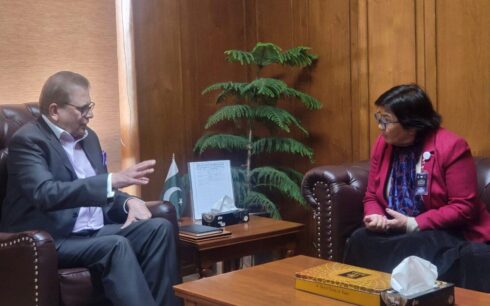KABUL, Afghanistan — Belarus has expressed interest in expanding trade ties with Afghanistan, according to the Taliban’s Ministry of Industry and Commerce, following a meeting between Kazintas Andrei, Belarus’s Deputy Minister of Industry, and Nooruddin Azizi, the Taliban’s minister of industry and commerce.
According to a statement from the ministry, the Belarusian official emphasized strengthening trade between the two countries and proposed holding joint trade exhibitions and forums to foster “economic and trade relations.”
So far, Belarusian officials, including the Ministry of Industry, have not commented on the meeting.
Azizi highlighted the importance of addressing Afghanistan’s trade imbalance, the ministry said. Economists, however, have expressed concern about the unprecedented trade deficit that has emerged under the Taliban’s rule. They warn that Afghanistan’s reliance on imports, coupled with declining exports, is exacerbating poverty and unemployment, turning the country into a consumption-driven economy.
On Jan. 5, Taliban’s commerce ministry said that Afghanistan’s trade volume reached $12.42 billion in 2024, an increase from $10.8 billion the previous year. The figures underscored a significant trade imbalance, with imports far outweighing exports.
The ministry reported that exports amounted to $1.803 billion, while imports surged to $10.619 billion—a 38 percent increase from $7.71 billion in 2023. In contrast, exports declined by 4 percent from $1.884 billion the previous year. These shifts have resulted in a trade deficit of $8.816 billion for 2024.
The figures reveal that exports accounted for only 15 percent of Afghanistan’s total trade, while imports made up the remaining 85 percent.
The ministry acknowledged a decline in exports to key markets such as Pakistan and China, although trade with Turkey and India saw significant growth. Additionally, exports to neighboring countries, including Iran, Kazakhstan, Uzbekistan, and the United Arab Emirates, reportedly doubled, reflecting an expansion of regional trade ties.
Afghanistan’s major export products include pomegranates, figs, raisins, asafoetida (hing), and coal. Imports, meanwhile, continue to flow from countries such as Iran, the UAE, Pakistan, China, and Turkmenistan.
Despite the drop in exports, the Taliban’s Ministry of Industry and Commerce described the trade data as a sign of “economic stabilization and normalization.” The ministry claimed that reform policies and support for domestic trade have improved Afghans’ purchasing power.
The report comes as Afghanistan’s economy faces significant hurdles, including a heavy reliance on imports and declining export revenues. Analysts warn that the widening trade deficit could exacerbate economic pressures on the population. However, the expansion of trade with regional partners may offer opportunities for economic recovery.





